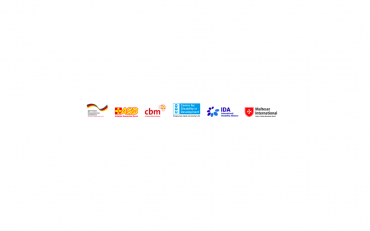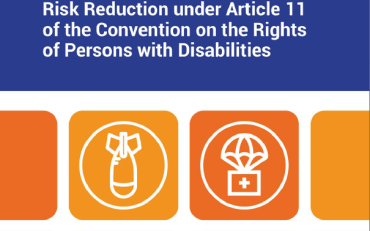Disasters do not affect all people equally. Persons with disabilities and other at-risk groups are often forgotten in disaster preparedness and left behind when disaster strikes. They are too often excluded from preparedness activities, and invisible when it comes to community and risk mapping or evacuation planning. Moreover, once evacuated, people with disabilities may have a difficult time accessing shelters and safe spaces as a consequence of environmental, institutional and attitudinal barriers they may face. Overall, people with disability are a lot more likely to be exposed to disproportionate risks and to receive insufficient or inappropriate assistance and support in times of crisis.
To foster change and to help improve this situation, IDA has joint several stakeholders for the project "Putting Persons with Disabilities at the Centre of Humanitarian Preparedness and Response: building and strengthening capacity in inclusive humanitarian action and inclusive disaster preparedness through the active inclusion of persons with disabilities."
IDA partners in this project include Arbeiter-Samariter-Bund (ASB), Malteser International (MI), Christoffel Blindenmission (CBM), and Centre for Disability in Development (CDD). The project duration is 32 months (May 2021 till December 2023). The project has a total budget of € 3,174,425.06 and is funded by Germany Federal Foreign Office (FFO).
The vision of the project is to foster inclusive approaches to disaster risk reduction and humanitarian action. It brings together key actors from the international to the community level to generate knowledge, develop capacity and explore best practice with regards to the implementation of the Sendai Framework (in particular Priority 4 and the commitment to inclusion) and the implementation of the IASC Guidelines on the Inclusion of Persons with Disabilities in Humanitarian Action.
IDA is leading the project implementation at the global level. Supporting advocacy efforts before, during and after regional and global DRR platforms is one of the main goals of the project at this level. the project will encourage collaboration amongst key actors to promote and advance the inclusive disaster risk reduction agenda and to position it at the centre of international debate. It will produce a research study on the status quo and develop a training curriculum to support the inclusive implementation of the Sendai framework at international and national level.
The national and community-based components of the project will be implemented in particularly disaster-prone countries on the African continent (Niger, Zimbabwe, Uganda), Asia (Bangladesh, Indonesia, Myanmar), and South/Central America (Colombia, Nicaragua). The objective is to foster exchange and to strengthen the capacity of national and local governmental and non-governmental actors to best work towards and engage in inclusive disaster risk reduction measures. Moreover, the project intends to pilot promising and innovative approaches at the community level generating best practice and lessons learnt. The country teams work closely with organisations of persons with disabilities (OPDs) - many of which are implementing partners in the project - to ensure quality exchange and programming.
Through this unique type of project, the project partners aim to make an important contribution to reducing the undue risk people with disabilities face in the event of a disaster by raising awareness, producing knowledge, and building and strengthening the capacity of all relevant actors.

